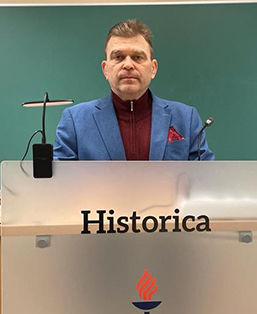


I have worked in the University of Jyväskylä since 1993. At now, I am Senior Reseacher in the Department of History and Ethnology of the University of Jyväskylä. I have been the responsible teacher of the Master’s programme in Achival Studies (2013–2020) / the Study module in data management (2020–).
I held the title of docent (adjunct professor) in four universities (Universities of Jyväskylä, Helsinki, Oulu, and Turku).
One of my specialities is History of Sports (sports and society). I have published several scientific monographs and articles (refereed) in diffent fora about the subject.
I have been the chairman of the Finnish Society for Sport History since 2008; and I have been the editor-in-chief for the scientific, refereed publication ‘The Yearbook of the Finnish Society for Sport History’ since 1997.
«Archives, Gender Equality and Sexual Harassment – Social Memory as a Constructor of Societal Understanding»
Gender equality and the absence of sexual harassment are basic rights for individuals. People pay attention on these themes nowadays. Nevertheless, they are not just modern phenomena as they can be recognised from historical documents even if the terminology alters from our current societal understanding.
As for societal understanding, document describing our own time or the past are essential contributors for it. This is the point in which archives have important role. They contain the documents which, for instance, contains information about the past, data upon that we build our understanding… but only if the relevant documents have been spared in archives. It is: the archives are the base of our social memory. Consequently, the archive materials are constructors of our societal understanding.
In this presentation, we tell how and why the archives construct our societal understanding when it comes to gender equality and sexual harassment. The point of view is based on archival theory and practical knowledge on Archival Studies. Gender equality and sexual harassment are used as examples so that the essential mater related on basic right can be high-lighted and discussion about the topic could be risen.